-
Our Agency
- About Us
- Calendars
- Contact Us
-
Directions
- ACCESS
- ACES at Chase
- ACES International Preschool and Childcare Center
- ACES Transportation Services
- Center for Autism Spectrum and Developmental Disorders
- Central Office
- Educational Center for the Arts
- Educational Technology
- Little Theatre on Lincoln Street
- Mill Road School
- Network Services
- Staff Development / Administration
- Village School
- Whitney High School North
- Wintergreen Interdistrict Magnet School
- Human Capital Development
- Education Foundation
- News / Press
- Publications
- Request for Proposals
- Employment
- Events & Workshops
- Referrals
-
Schools & Programs
-
Special Education Schools
- Center for Autism Spectrum and Developmental Disorders
- Mead Elementary School
- Mill Road School
- Village School
- Whitney Academy EXPLORE & CREATE
- Whitney High School North
-
Magnet Schools
-
ACES at Chase
- About Us
- ACES at Chase: History & Origins
- Admissions
-
Student and Family Portal
- Breakfast and Lunch Menus
- Cancellations, Delays, and Early Dismissal
- Community Health Center
- Dress Guidelines
- Family Teacher Organization (FTO)
- Health Office
- Principal's Corner
- Monitoring Grades: PowerSchool Parent Portal
- Quick Links
- Student Handbook
- Summer Reading and Math
- Technology & Digital Citizenship
- Virtual Suggestion Box
- Document Library
- Contact Us
- Back to ACES
- Educational Center for the Arts
- Wintergreen Interdistrict Magnet School
-
ACES at Chase
- Alternative Education
- ACES Early Head Start
- ACES International
-
ACES International Preschool and Childcare Center
- About Us
- ACES International Preschool and Childcare Center Donations
- Admission Interest
- Meet the Staff - Newtown Center
- Meet the Staff - Woodbury Center
- Calendar
- Contact Us - Newtown Center
- Contact Us - Woodbury Center
- Family Portal
- Enroll Now: ACES International Preschool and Childcare Center Newtown Location
- Back to ACES
- ACES Open Choice
- Family and Community Engagement
- Magnet School Parent Choice
- School-Based Services
-
Special Education Schools
-
Services
- ACCESS Adult Vocational Services
- ACES Insurance Collaborative
- ACES UP Renewable Energy Solutions
- Alternate Routes to Certification
- Business Partnership Opportunities
- Center for Safe Schools
- Clinical Services
- Educational Technology
- Facility Rental
- Fingerprinting
- International Programming
- Marketing and Communications Services
- Network Services
- Professional Learning
- Regional Education Councils
- Regional Special Education Transportation
- Speech and Language Services
- Transportation
- World Language Services
- Find

Adult Vocational Services
Alternate Routes to Certification
Assistive Technology
Autism Programs
Behavior Services
Business Partnership Opportunities
Councils
Early Childhood Services
Facilities and Construction Management
Facility Rental
Fingerprinting
Insurance Collaborative
International Programming
Minority Teacher Recruitment
Occupational Therapy
Physical Therapy
Professional Learning Services
Technology
Transportation
Visual Impairment
By audience content
Special Education Schools:
Center for Autism Spectrum and Developmental Disorders
Mill Academy
Mill Road School
Village School
Whitney Academy EXPLORE & CREATE
Whitney High School North
Magnet Schools:
Educational Center for the Arts
Thomas Edison Middle School
Wintergreen Interdistrict Magnet School
ACES International
Choice Program
Collaborative Programs
Early Head Start
News / Press

- About Us
- Calendars
- Contact Us
-
Directions
- ACCESS
- ACES at Chase
- ACES International Preschool and Childcare Center
- ACES Transportation Services
- Center for Autism Spectrum and Developmental Disorders
- Central Office
- Educational Center for the Arts
- Educational Technology
- Little Theatre on Lincoln Street
- Mill Road School
- Network Services
- Staff Development / Administration
- Village School
- Whitney High School North
- Wintergreen Interdistrict Magnet School
- Human Capital Development
- Education Foundation
- News / Press
- Publications
- Request for Proposals
 ACES Announcements
ACES Announcements
-
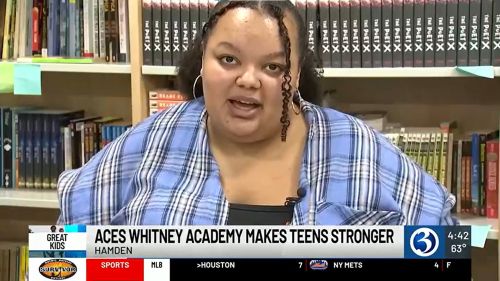 Wednesday, March 12th, 2025
Hamden teen uses poetry to overcome trauma and inspire others
HAMDEN, Conn. (WFSB) - A young woman from Hamden turned her past trauma into triumph through poetry.
18-year-old Bell...
See Details
Wednesday, March 12th, 2025
Hamden teen uses poetry to overcome trauma and inspire others
HAMDEN, Conn. (WFSB) - A young woman from Hamden turned her past trauma into triumph through poetry.
18-year-old Bell...
See Details
-
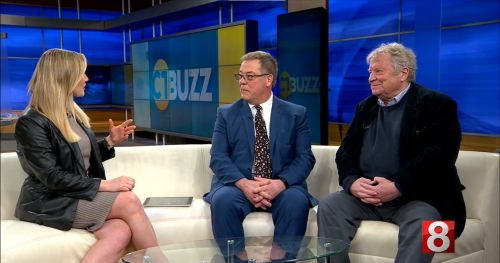 Monday, March 10th, 2025
The ACES UP/Green Schools, Clean Classrooms Program Integrates Renewable Energy & Clean Indoor Air Quality at Area Schools
NEW HAVEN, Conn. (WTNH) – CT BUZZ Host Natasha Lubczenko welcomed Timothy Howes, Deputy ...
See Details
Monday, March 10th, 2025
The ACES UP/Green Schools, Clean Classrooms Program Integrates Renewable Energy & Clean Indoor Air Quality at Area Schools
NEW HAVEN, Conn. (WTNH) – CT BUZZ Host Natasha Lubczenko welcomed Timothy Howes, Deputy ...
See Details
-
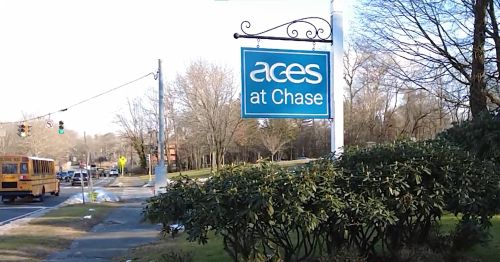 Wednesday, January 29th, 2025
Apply to ACES at Chase for 2025-2026 School Year
ACES at Chase is a nationally-recognized public STEAM Magnet School on a private campus in Waterbury. The school prepare...
See Details
Wednesday, January 29th, 2025
Apply to ACES at Chase for 2025-2026 School Year
ACES at Chase is a nationally-recognized public STEAM Magnet School on a private campus in Waterbury. The school prepare...
See Details
-
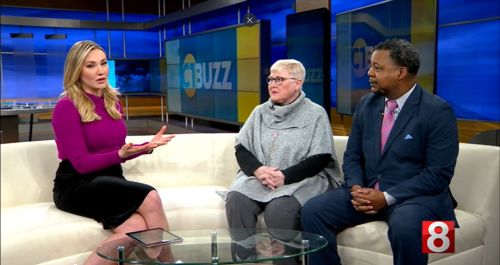 Friday, January 24th, 2025
Area Cooperative Educational Services (ACES) – Magnet School Parent Choice
CT Buzz’s Host Natasha Lubczenko recently welcomed Lynn Bailey, Choice & Regional Transportation Co...
See Details
Friday, January 24th, 2025
Area Cooperative Educational Services (ACES) – Magnet School Parent Choice
CT Buzz’s Host Natasha Lubczenko recently welcomed Lynn Bailey, Choice & Regional Transportation Co...
See Details
-
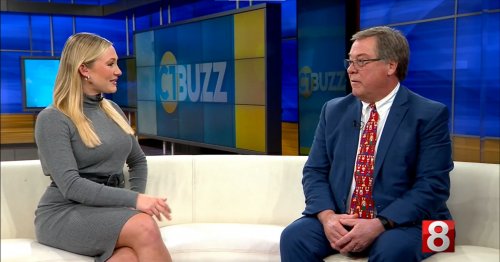 Thursday, November 14th, 2024
ACES’ Commitment to the Community: Official Sponsor of the GR8 CT Food Drive for Thanksgiving
NEW HAVEN, Conn. (WTNH) – CT Buzz Host Natasha Lubczenko sat down with Timothy Howes, Deputy Executive ...
See Details
Thursday, November 14th, 2024
ACES’ Commitment to the Community: Official Sponsor of the GR8 CT Food Drive for Thanksgiving
NEW HAVEN, Conn. (WTNH) – CT Buzz Host Natasha Lubczenko sat down with Timothy Howes, Deputy Executive ...
See Details
-
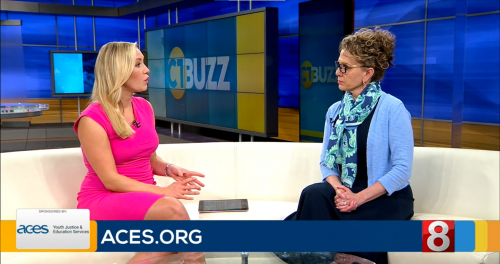 Monday, September 30th, 2024
ACES - Youth Justice and Educational Services
On today’s CT BUZZ, Host Natasha Lubczenko sits down with Lisa Simone, Director of ACES You...
See Details
Monday, September 30th, 2024
ACES - Youth Justice and Educational Services
On today’s CT BUZZ, Host Natasha Lubczenko sits down with Lisa Simone, Director of ACES You...
See Details
-
Our Agency
- About Us
- Calendars
- Contact Us
-
Directions
- ACCESS
- ACES at Chase
- ACES International Preschool and Childcare Center
- ACES Transportation Services
- Center for Autism Spectrum and Developmental Disorders
- Central Office
- Educational Center for the Arts
- Educational Technology
- Little Theatre on Lincoln Street
- Mill Road School
- Network Services
- Staff Development / Administration
- Village School
- Whitney High School North
- Wintergreen Interdistrict Magnet School
- Human Capital Development
- Education Foundation
- News / Press
- Publications
- Request for Proposals
- Employment
- Events & Workshops
- Referrals
-
Schools & Programs
-
Special Education Schools
- Center for Autism Spectrum and Developmental Disorders
- Mead Elementary School
- Mill Road School
- Village School
- Whitney Academy EXPLORE & CREATE
- Whitney High School North
-
Magnet Schools
-
ACES at Chase
- About Us
- ACES at Chase: History & Origins
- Admissions
-
Student and Family Portal
- Breakfast and Lunch Menus
- Cancellations, Delays, and Early Dismissal
- Community Health Center
- Dress Guidelines
- Family Teacher Organization (FTO)
- Health Office
- Principal's Corner
- Monitoring Grades: PowerSchool Parent Portal
- Quick Links
- Student Handbook
- Summer Reading and Math
- Technology & Digital Citizenship
- Virtual Suggestion Box
- Document Library
- Contact Us
- Back to ACES
- Educational Center for the Arts
- Wintergreen Interdistrict Magnet School
-
ACES at Chase
- Alternative Education
- ACES Early Head Start
- ACES International
-
ACES International Preschool and Childcare Center
- About Us
- ACES International Preschool and Childcare Center Donations
- Admission Interest
- Meet the Staff - Newtown Center
- Meet the Staff - Woodbury Center
- Calendar
- Contact Us - Newtown Center
- Contact Us - Woodbury Center
- Family Portal
- Enroll Now: ACES International Preschool and Childcare Center Newtown Location
- Back to ACES
- ACES Open Choice
- Family and Community Engagement
- Magnet School Parent Choice
- School-Based Services
-
Special Education Schools
-
Services
- ACCESS Adult Vocational Services
- ACES Insurance Collaborative
- ACES UP Renewable Energy Solutions
- Alternate Routes to Certification
- Business Partnership Opportunities
- Center for Safe Schools
- Clinical Services
- Educational Technology
- Facility Rental
- Fingerprinting
- International Programming
- Marketing and Communications Services
- Network Services
- Professional Learning
- Regional Education Councils
- Regional Special Education Transportation
- Speech and Language Services
- Transportation
- World Language Services
- Find

Advocacy, Commitment, Excellence, Service
Area Cooperative Educational Services does not discriminate on the basis of race, color, age, ethnicity, national origin, religion, gender, marital status, disability or sexual orientation.
